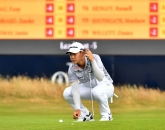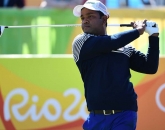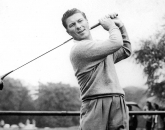
"To tweet, or not to tweet - that is the question:
Whether 'tis nobler in the mind to suffer
The slings and arrows of outrageous fortune
Or to let rip in a vengeful lather of recrimination"
In case you missed the story, inveterate tweeter Lee Westwood became embroiled in a most uncharacteristic tirade against his critics and detractors throughout the Sunday evening of last month's US PGA Championship at Oak Hill. One can only assume that he had resorted to the time-honoured method of drowning his sorrows, having once again failed to claim his first major, and lost control of his senses. I can attest from personal experience that he is normally a very cheerful drunk, so one can only surmise what dark place he had visited after yet another abortive campaign.
He later apologised for his inappropriate and uncharacteristic behaviour, but in a way the damage had been done. It showed a side to his character that is not often evident, although he was less than full of bonhomie for much of the early 2000s, when he was flitting from one coach to another trying to rediscover his swing. In that mission he succeeded and has become one of the best ball-strikers and straightest drivers around.
The trouble is that you cannot win a teddy bear at the local crazy golf course if you can't putt, let alone claim one of the game’s big four events. Westwood's skill on the greens used to be his strength back in the heady days at the turn of the century when he succeeded Colin Montgomerie (one of the aforementioned detractors) as Europe’s No 1. At that stage he was also one of the very best at closing out a tournament. Those skills seem to have deserted him under the intense pressure of trying to crown his career with a major that few, if any, would begrudge him.
So where's he going wrong and what can he do to put it right in time for Augusta 2014? I tried to find the answer from various sports psychologist friends, but professional ethics forbade them from giving specific answers, let alone being identified. However, one highly qualified and much decorated member of the fraternity, who is very familiar with golf, gave me some general points that might apply:
Preparation is crucial to performance but it has to be timely and appropriate to an up-coming event. This may require technical or physical emphasis. Many top performers tend to practice more nearer competition rather than concentrate on shorter quality practice - eg playing fewer (but high quality) tournaments and making sure they set correct goals for each of the these. It is preferable to have 'process' and 'performance' goals rather than a single 'outcome' goal.
During any competition there are phases. Firstly, and beforehand, getting into the right mind state. Secondly, on the start line, and then finally during the competition. Obviously in golf this almost repeats itself at each hole. Elite performers are very good at the first stage but then in competition, which is over such a long period, tend to have problems maintaining the 'Ideal Performance State’. What tends to happen is that something affects them to cause 'internal distractions' and they start thinking about this rather than on what they have to do next in this situation.
Once the internal distractions happen then there is a knock- on to the physical aspects, often seen in body language. Further problems arise because they now start to hit worse shots or at least ones that are not up to their expectations. So they then start to correct things and experiment with adjustments to swing, grip etc leading to a downward spiral in their confidence. After that they move to the phase of safety play - protecting their score - and finally, they stop really committing to the shot and start to distrust their swing. This is seen to be more prevalent on the last day of play.
Internal distractions are thoughts. You cannot think of two things at the same time - it is impossible. So if you have a ‘problem thought’ it needs to be replaced by a different thought that helps the individual in that situation or at least does not cause interference. This has to be practiced.
Over the years of my involvement with sport as a coach and psychologist I do believe the adage "form is temporary but class is permanent". I think Woods and Westwood both have class and will shine through in 2014.
Pages
Click here to see the published article.











